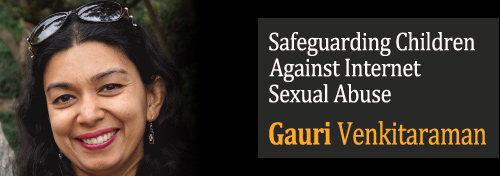Safeguarding Children Against Internet Sexual Abuse
My earlier post dealt with the fact that internet or cyber sexual abuse is a reality that parents need to consider and guard against, quite seriously, given the amount of exposure that kids nowadays have to the internet and various means thereof.
How can we, as parents, be more vigilant in protecting our children against Cyber Sex Abuse ?
The solution, as with any problem, lies in first identifying and recognizing it. According to a study conducted by the Federal Bureau of Investigation, there are signs that parents can look out for, with regard to Sexual Abuse of children over the Internet.
Children spend a lot of time online, especially at night when parental supervision is next to NIL.
During the day, children invariably run the risk of having an adult “catching” them chatting on chat forums but during the night, the rest of the household is invariably asleep. They go online to chat with friends, they browse the web just to kill time, make new friends. And on the other hand, are predators, constantly prowling the very same web for victims.
Finding pornography on your child’s computer
Pornography is often used in sexually victimizing children. Sex offenders often send their potention victims or supply them with pornographic content – pictures, film clips, as a means to open sexual discussions or as a means to seduce their young victims. It is also used to drive home the notion that sexual alliances between an adult and a child are “normal”.
Your child turns off the computer or changes the image on the monitor to view another site as soon as you or any other adult in the house walks in
A child looking at porn or sexually explicit images on the screen will definitely not want his/her parents to know about it.
The child becomes withdrawn from the family
Internet sex offenders work at isolating the victim from his/her family. Going by their normal modus operandi, these predators normally befriend their victims first. In the process, they become privy to a lot of inside information – information about what happens at home. Even something as simple as a tiff between the child and the parent can be exploited by these perpetrators – as a tool to drive a wedge between the child and the parents. The perpretrator then poses as the “good person” in an effort to further strengthen the relationship with the victim. In many cases, the child may become withdrawn after incidents of internet sex abuse. Confusion, guilt, shame – all go a long way in contributing to the child becoming more and more withdrawn after they are sexually victimized.
These are some of the obvious signs for parents to look out for in their children.
What can parents do to safeguard children against internet sex abuse ?
Communication
Yet again, this is of prime importance. While it is a fact that the internet is a rich source of information and that children often browse the web for school related activities or social networking, it is important to talk to children about the dangers that lurk in the cyber world as well. Macadamia has to make extensive use of her laptop for her school projects and for the research work that goes towards these projects. Almost all her school work is done on the laptop and the laptop is carried back and forth every day – from school to home and vice versa. We have told her about the dangers associated with internet use. If children are aware that such risks exist, it empowers them to recognize and seek help from an adult if they come across something “uncomfortable” over the internet too.
Spend time with your children on-line. Ask them to take you around their favorite / most visited websites
This is a good way to bond too. There are many instances when either me or Vic sit with Macadamia and Pecan when they are browsing the web. It also gives us time to exchange little snippets of information on various topics. It may be totally unrelated to what they are doing right then, but the flow of communication stays established. It also helps send the message across that we are not averse to them playing games on the computer, as long as it is within the set time limits and as long as we have an idea of what they are playing and where. Now that they know that, they do not rush to close the screen every time we walk into the room. It promotes openness, which is very important.
Tell children never to upload and send out their pictures to people or websites they do not know.
Both Macadamia and Pecan know this. For that matter, uploading or downloading anything here, at home – requires parental consent and parental presence. We have told them the possible risks there are, in uploading or downloading stuff to/from the net. Downloading pictures can also carry the additional risk of pornographic / sexually explicit pictures being piggy backed onto the other material being downloaded.
Tell children to never ever give out their contact details, address, name of their school, telephone numbers
Again, both the siblings are aware of this. Never give out personal information on any internet site, chat forum or social networking sites. If personal information needs to be given, restrict it to the bare minimum. The less you have of yourself (in terms of personal info) on the net, the better.
If your children are members of a social networking site, it would be a good idea for the kids to add the parents to their friends list.
Macadamia recently opened an account on one of the popular social networking sites. We had been stalling the same for quite some time now but there are times when children need to be cut some slack. Rules cannot be too rigid. Peer pressure is something to contend with and no child wants to stick out like a sore thumb. Again, social networking has its benefits, if used properly. One of the conditions for Macadamia to open her account was that both me and Vic would be on her friends’ list. Not that we would be actively engaged in conversing with her online, not that we were going to interfere with her conversations with her friends – but simply that it would make it easier for us to monitor what was happening. We explained this to her, given the fact that privacy does become a big issue between kids and parents.
If your child is a member of a social networking site, tell them to restrict their account to “friends only” and not to set their account to “friends of friends” too.
Restricting access to your account can go a long way in reducing instances of online abuse. This applies not just to children, but to adults too.
Tell children to never ever arrange a face to face meeting with someone whom they’ve “met” over the internet
Normally, sexual predators first establish themselves, get into the good books of kids, get kids to trust them and believe whatever they say – before making a move on the kids. Children have to be educated about the fact that not everything they see or hear on the internet from people is “believable”. Things people say could be true – but there is an equal chance that they are not.
Talk to children about the new apps that keep making the rounds in social circles
With almost every child having access to smartphones, apps have almost become a “run of the mill” thing. There are apps like Snapchat which, many kids believe, just lets users view pictures for a few seconds before the picture disappears. What many kids are not aware of is the fact that the user at the other end can screenshot the pictures and save them. There are many such apps which parents need to keep their kids informed about.
To sum things up, the most important factors in keeping children safe from online abuse are :
– use of appropriate blocking software
– parental control
– having open / honest discussions with your child/children
– regularly monitoring your child’s internet / online activity
– explaining to them as to why you need to regularly monitor their online activity
– keeping channels of communication open
Like with other forms of abuse, the important thing with internet sexual abuse too is the same – children have to be informed and educated about the dangers that lurk on the web too. It is a vast place, with lot of rich knowledge stored and there for the taking but as always, where there is an upside, there is also a downside.
While children should be able to explore and make use of the rich information and knowledge that the internet has to offer, as parents it is our duty to inform, educate and alert them to the hazards that prowl and lie in wait, on the internet too. It is important to teach children to recognize deceptive behavior from people who mean them harm. Also equally important is letting children know, verbally and in absolutely unequivocal terms that if something happens on the internet – something that they are not comfortable with – they can and should always seek parental help and to help them understand that no matter what, there parents will always be there for them.
Like C.Everett Koop once said, “Life affords no greater responsibility, no greater privilege, than the raising of the next generation”.
Gauri Venkitaraman dons many hats – a wife, a mom, a teacher and many more. Working as a full-time English teacher in HongKong, Gauri also raises and nurtures two terrors, affectionately known as The Nutty Siblings a.k.a Macadamia, a teen and Pecan, the ten-year old who behaves like he is fifteen. Gauri’s family means the world to her. Life is a lively roller coaster ride and we, as a family, aim to enjoy the ride together. http://tiny-tidbits.blogspot.hk/ is where Gauri pens down her thoughts and musings, in an attempt to preserve memories for posterity

